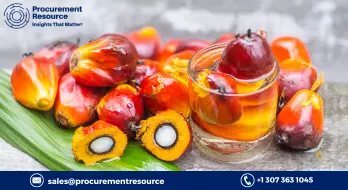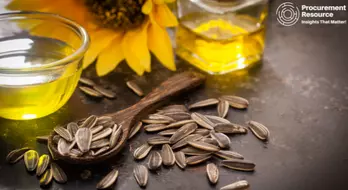Ukraine Conflict May Reduce Sunflower Oil Supply to India by 25%

Sunflower oil is extracted from sunflower seeds and is currently the third most consumed edible oil in India by volume, trailing only palm oil and soybean oil. Most sunflower oil demand comes from India's southern states, and Ukraine is India's largest sunflower oil supplier.
According to a report, the ongoing conflict in Ukraine, the world's largest sunflower grower, is likely to result in a 25% or 4-6 lakh tonnes shortage of crude sunflower oil supplies in India next fiscal year. Around 70% of crude sunflower oil imported into India comes from Ukraine, with the remaining 20% from Russia.
Domestic edible oil processors' balance sheets are healthy enough to withstand supply disruptions caused by Russia's invasion of Ukraine, but this will impact domestic edible oil processors' production planning, according to rating agency CRISIL on Thursday. Refined sunflower oil accounts for 10% of the country's annual consumption of 230-240 lakh tonnes of edible oils, with imports meeting nearly 60% of the demand.
As much as 90% of the country's annual crude sunflower oil requirement of 22-23 lakh tonnes comes from Ukraine (70%) and Russia (20%), with the remainder coming from other countries like Argentina. According to CRISIL Rating, supply shortages caused by the Russia-Ukraine conflict may result in a supply shortfall of at least 4-6 lakh tonnes of crude sunflower oil for India's next fiscal year.
Each year, Ukraine and Russia export 100 lakh tonnes of crude sunflower oil, with Argentina ranking third with 7 lakh tonnes of outbound shipments. According to the report, the problem is that Russia's central banks were cut off from the SWIFT system following its invasion of Ukraine and the subsequent sanctions imposed by the US and European nations. Even though trading food products with Russia are not prohibited, trade settlement has become difficult, resulting in supply disruptions.
Domestic edible oil processors typically keep a 30-45-day supply of raw materials on hand, which should help them weather the supply shock in the short term. However, if the conflict and the resulting trade disruption continue, supply and prices will suffer.
If trade is disrupted for an extended period, edible oil processors will be forced to source more crude sunflower oil from Argentina. This, however, will not be enough to compensate for the significant volume shortfall from Ukraine and Russia. The reports further mention that the processors may choose to refine other edible oils to reduce the resulting idle capacity.
The supply disruption comes on top of a 25% year-on-year increase in the average price of refined edible oils this fiscal year, while crude edible oil prices have risen due to supply-side factors. Crude soybean oil, for example, has risen because of a poor crop in Brazil, while crude palm oil has risen because of low output in Indonesia and Malaysia, the world's top producers. More than 75% of the country's edible oil imports are soybean oil and crude palm oil. Moreover, the hype in raw material prices will compel processors to incur additional debt to meet different working capital requirements.


.webp)

